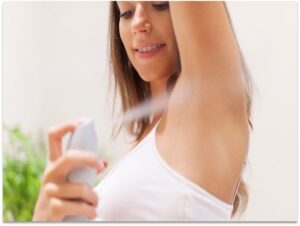Are you tired of using personal care products that are filled with chemicals and synthetic ingredients? If so, it's time to start shopping for all-natural products that are better for your health and the environment. In this guide, we'll show you how to read labels and shop for all-natural personal care products, including deodorants, to ensure you're getting truly natural, chemical-free options.
Why Choose All-Natural Personal Care Products?
There are many reasons why you might want to switch to all-natural personal care products:
- Chemical-free: Traditional personal care products can contain a long list of harmful chemicals that can be absorbed through your skin and into your body.
- Eco-friendly: Many all-natural personal care products are packaged in eco-friendly containers and are better for the environment.
- Gentler on skin: All-natural products are often gentler on the skin, making them a good choice for people with sensitive skin.
- Cruelty-free: Many all-natural personal care products are not tested on animals, making them a more ethical choice.
Understanding All-Natural Labels
When shopping for all-natural personal care products, it’s important to know how to read labels. Unfortunately, many products that claim to be “natural” or “organic” may still contain synthetic ingredients. Here are some key terms to look for:
- 100% natural: This term should mean that all the ingredients in the product are natural and have not been chemically processed.
- Organic: Products that are labeled “organic” should contain at least 95% organic ingredients.
- Certified organic: Products that are certified organic have been verified by a third-party organization and should contain at least 95% organic ingredients.
- Cruelty-free: This label means that the product has not been tested on animals.
- Non-toxic: This label means that the product does not contain any toxic ingredients.
Ingredients to Avoid

Why You Should Avoid These Things in Your Personal Care Products
Personal care products are a part of our daily routine, but have you ever wondered what ingredients they contain and whether they are safe for your health? Many personal care products contain harmful chemicals that can have negative impacts on your health. In this article, we will focus on four common ingredients to avoid in personal care products: parabens, sodium lauryl sulfate (SLS), phthalates, and triclosan.
Parabens
Parabens are a type of preservative commonly used in personal care products to prevent the growth of bacteria and mold. However, research has shown that parabens can mimic estrogen in the body, leading to hormone disruption. This hormone disruption has been linked to breast cancer and reproductive issues.
Parabens are often listed on ingredient labels as methylparaben, ethylparaben, propylparaben, butylparaben, or isobutylparaben. To avoid parabens, look for products that use natural preservatives such as grapefruit seed extract or vitamin E.
Sodium Lauryl Sulfate (SLS)
Sodium lauryl sulfate is a common foaming agent used in personal care products such as shampoo, body wash, and toothpaste. SLS can cause skin irritation and has been linked to organ toxicity.
To avoid SLS, look for products that use natural foaming agents such as coconut oil or castile soap. Products that are labeled as “sulfate-free” will also be free of SLS.
Phthalates
Phthalates are often used in fragrances and plastics in personal care products. Phthalates can disrupt hormones and have been linked to reproductive issues, including reduced fertility and birth defects.
Phthalates can be listed on ingredient labels as dibutyl phthalate (DBP), diethyl phthalate (DEP), or dimethyl phthalate (DMP). To avoid phthalates, look for products that use natural fragrances or are labeled as “phthalate-free.”
Triclosan
Triclosan is an antimicrobial agent that is commonly used in personal care products such as hand sanitizer and soap. Triclosan can disrupt hormone function and contribute to antibiotic resistance.
To avoid triclosan, look for products that use natural antimicrobial agents such as tea tree oil or alcohol. Products labeled as “antibacterial” may also contain triclosan, so it is best to avoid those products altogether.
Why It Matters
Avoiding these harmful chemicals in personal care products is important for our health and well-being. Many of these chemicals have been linked to hormone disruption, reproductive issues, and even cancer. By choosing products that use natural and safe ingredients, we can reduce our exposure to these harmful chemicals and promote overall health.
When shopping for personal care products, it is important to read ingredient labels and look for products that are free of parabens, SLS, phthalates, and triclosan. By being mindful of the products we use, we can make informed decisions that promote our health and well-being.
Shopping for All-Natural Deodorant
Deodorant is an important personal care product that can help to keep you feeling fresh and clean. However, many traditional deodorants contain aluminum, which has been linked to breast cancer and other health problems. When shopping for all-natural deodorant, look for products that:
- Are free from aluminum and other harmful chemicals
- Contain natural ingredients like magnesium, clays, and essential oils
- Come in eco-friendly packaging
- Are cruelty-free
Final Thoughts
When it comes to personal care products, it’s important to be an informed consumer and make choices that are best for your health and well-being. By understanding how to read labels and identify truly all-natural products, you can make sure you’re not exposing yourself to harmful chemicals and toxins.
Remember, the switch to all-natural personal care products may take some time and experimentation, but the benefits to your health and the environment are worth it. With the tips and information provided in this guide, you’ll be well on your way to shopping for and using all-natural personal care products with confidence.

